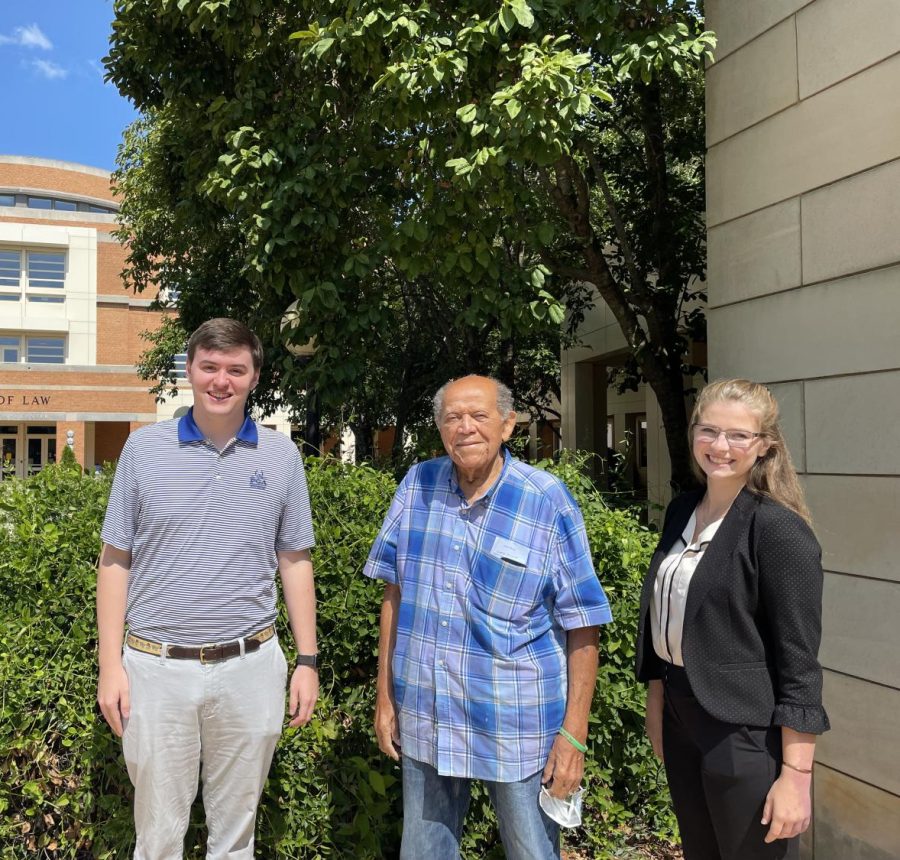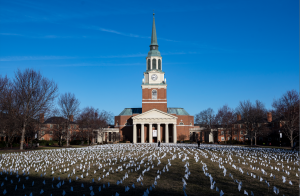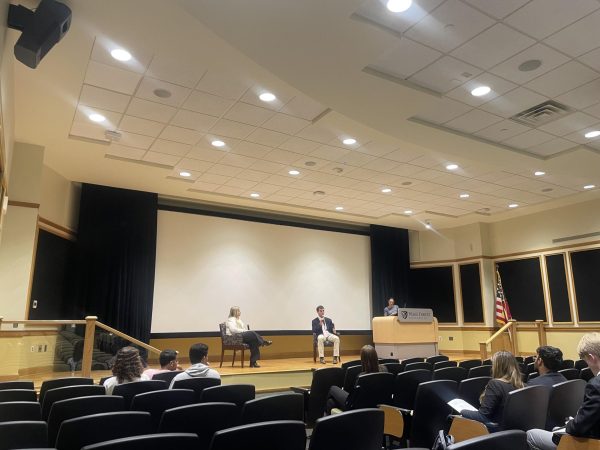With help from WFU law students, a Korean War soldier will finally receive his purple heart
Students from Wake Forest Law School’s Veterans Legal Clinic helped overturn soldier James Brown’s racially-motivated dishonorable discharge
Courtesy of Wake Forest School of Law
Korean War veteran James Brown (center) stands with his legal team, 2022 WFU Law graduates William Crotty (left) and Ashley Willard (right).
June 2, 2022
Through the advocacy of the Wake Forest School of Law Veterans Legal Clinic, Korean War soldier and Leland, NC resident James Brown had his racially-motivated dishonorable discharge set aside last month and was able to have his Purple Heart award restored — an honor he had been waiting to receive for more than 70 years.
Under the guidance of Eleanor Morales, Assistant Clinical Professor of Law and Director of the Veterans Legal Clinic, recent Wake Forest School of Law graduates Williavetm Crotty and Ashley Willard argued Brown’s case to the Army Board for Correction of Military Records.
In 1951, Brown voluntarily enlisted in the U.S. Army at 17 years of age and was deployed to Korea shortly after completing his training. Brown was among the few Black men in his unit, as the Army had only integrated three years prior.
While on patrol overseas, Brown was caught under enemy fire and suffered severe shrapnel injuries. He was evacuated to Japan and hospitalized for almost two months to treat his injuries. In 1954, he was awarded a Purple Heart for his honorable sacrifice and service; however, Brown never received his Purple Heart.
After his recovery, Brown was sent back to Korea to continue fighting. While there, he raised a tactical safety concern to his commanding officer — a misunderstanding that resulted in a general court-martial, a dishonorable discharge and a five-year prison sentence.
According to Willard, receiving a conviction at a general court-martial is a felony conviction. Morales added that this penalty also results in the loss of honor and oftentimes a severance from the veteran community.
“Brown signed up to give his life for his country, nearly died for it and then was dishonorably discharged, which barred him from the veteran community permanently,” Morales said.
Brown considers himself blessed for being able to find a job that did not question his record; however, he said he still “feels like less than a citizen” due to his punitive discharge.
I have always felt that I had been wronged by my superior. I wanted to clear my name more than anything
— James Brown
Morales assigned Brown’s case to Crotty and Willard in the spring of 2021. They were eager to help Brown as the injustices he faced were overwhelmingly obvious to them. He was called racial slurs by his superior officers, and his trial was presided over by an all-white panel. Crotty explained the evidence they found for the racial biases in Brown’s case.
“We used data from the Department of the Defense,” Crotty said. “They basically did a study finding that the military justice system was racist in the 1970s, and it wasn’t any better 20 years before that in the 1950s. There was hard evidence around outcomes of courts martial depending on the race of the defendants.”
Willard and Crotty worked for more than six months before Brown’s case was ready to be submitted to the Army Board for Correction of Military Records. They agreed that the most difficult part of the process was obtaining and deciphering Brown’s military records.
“We spent so much time making record requests, and it turned out that many of his records that were supposed to be kept at the National Personnel Records Center were lost in a fire,” Willard said. “He didn’t have many of his records, which makes it extremely difficult for him to be able to prove what happened. It’s a lot harder than you might think to prove to the board that you deserve something especially when you lose your records.”
The clinic also recruited the help of a U.S. senator who requested Brown’s case be expedited as well as a military historian that provided context for the time of Brown’s military service. Additionally, the clinic worked with a mental health professional that empowered the students to advise and counsel their client from a trauma-informed perspective. The case was completed and submitted last fall.
Brown continued to seek justice after so many years because he wanted to finally see his name and reputation cleared.
“I have always felt that I had been wronged by my superior,” Brown said. “I wanted to clear my name more than anything.”
When the decision was released in May, Brown was elated.
“I was happy as can be and called practically everyone that I knew to let them know that I had received the decision,” Brown said.
Brown’s resilience — an attribute that his legal team greatly admires— has allowed him to live a long life with a successful career and family. Now, Brown will be admired for his service as well.
The Wake Forest School of Law Veterans Legal Clinic works on cases like Brown’s throughout the academic year. Law students learn transferable legal skills through a multidisciplinary and trauma-informed approach while providing critical assistance to low-income former service members to correct injustices in their military records. Both Crotty and Willard speak highly of their time at the clinic, and Brown could not be more thankful for their work on his case.
Today, Brown keeps busy by staying involved with his church and giving back to his community. The Veterans Legal Clinic plans to host a Purple Heart ceremony for Brown in the near future to honor him for his service and sacrifice.
Correction June 2, 2022: A previous version of this article used an incorrect legal term to refer to an action taken by the Army Board for Correction of Military Records. Additionally, a quote from Professor Elanor Morales was edited for further clarity.
Further Correction: An earlier version of this article incorrectly referred to Mr. James Brown as a veteran. As his veteran status is still pending, that characterization is incorrect.





















